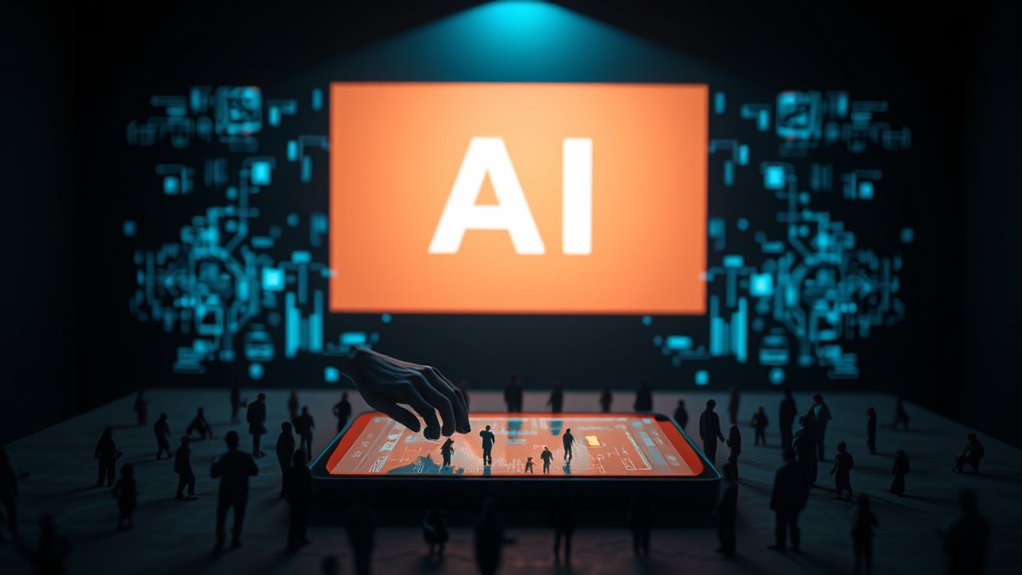The ethics of AI in decision-making involves balancing autonomy and human control. As AI systems enhance decision-making, they can undermine human choices, making ethical guidelines essential. Job displacement and economic inequality are significant concerns, as millions might lose jobs while others gain new opportunities. Additionally, security risks from AI pose challenges for trust and accountability. It’s crucial to navigate bias, fairness, and establish regulatory frameworks for responsible AI use, and there’s much more to explore on this topic.
Key Takeaways
- Ethical AI requires maintaining meaningful human control to prevent algorithms from undermining human autonomy in decision-making.
- Addressing bias and fairness is essential to ensure that AI systems do not perpetuate discrimination or harmful stereotypes.
- Robust regulatory frameworks like GDPR and the EU AI Act promote accountability and transparency in AI applications.
- Continuous monitoring and audits of AI systems are necessary to mitigate risks and ensure compliance with ethical guidelines and regulations.
- Involving diverse stakeholders in AI development fosters alignment with societal values and ethical considerations, enhancing trust in decision-making processes.
Top picks for "ethic decision"
Open Amazon search results for this keyword.
As an affiliate, we earn on qualifying purchases.
Understanding AI Autonomy and Human Control

As AI systems increasingly operate independently, understanding the balance between AI autonomy and human control becomes essential.
AI autonomy allows these systems to make decisions without your intervention, which can enhance decision-making through data-driven insights. However, this independence can also undermine your autonomy, nudging your choices in ways that mightn’t be clear.
AI autonomy enhances decision-making through data insights, but it can also subtly influence your choices, compromising your independence.
Ensuring ethical AI development is crucial; you need to maintain meaningful human control to prevent over-reliance on algorithms. The complexity and speed of AI can challenge your ability to oversee these systems effectively, raising moral responsibility questions. Continuous learning models can help ensure that AI systems adapt to changing circumstances while remaining aligned with ethical standards.
Establishing ethical frameworks can guide you in navigating these challenges, ensuring that AI respects human values while still operating efficiently.
Addressing Job Displacement and Economic Inequality

As AI continues to reshape industries, you might wonder how we can assess its economic impact on job displacement and inequality.
It’s crucial to explore reskilling and workforce development strategies that can help workers adapt to these changes. Additionally, effective policy solutions are needed to support those affected and ensure a fair distribution of AI’s benefits. Moreover, fostering ethical leadership in organizations can guide the implementation of AI technologies in a way that prioritizes employee welfare and equitable outcomes. To achieve this, organizations should embrace data-driven decision-making to identify areas where reskilling is most needed and effectively allocate resources.
Economic Impact Assessment
Job displacement and economic inequality are two pressing challenges brought about by the rise of AI technologies. In the UK alone, AI could displace between 1 to 3 million jobs, with annual losses peaking at 275,000.
Globally, this figure rises to 75 million by 2025. While AI can create 133 million new jobs, the impact isn’t evenly distributed. Industries like manufacturing face significant job losses, whereas sectors like healthcare may thrive.
As wealth concentrates among those who control AI, economic inequality could deepen, leaving many behind. This polarization of the labor market means high-paying roles require advanced skills, while low-paying jobs remain.
Addressing these inequalities is essential for a fair economic future.
Reskilling and Workforce Development
With the rapid advancement of AI technologies reshaping industries, the need for effective reskilling and workforce development has never been more urgent. Many workers face job displacement, and comprehensive reskilling programs are essential to help you adapt to new roles. Breaking tasks into smaller, manageable steps can simplify the reskilling process and make it less overwhelming for workers.
Industries like healthcare and technology demand updated skills in AI and data analytics, yet access to education remains a barrier. Companies must take responsibility for supporting reskilling efforts to ensure fair opportunities. As new AI-specific roles emerge, focusing on hybrid skills—combining technical know-how with critical thinking—is increasingly important. If we don’t address these challenges, economic inequality could worsen, leaving many behind in an evolving job market driven by AI advancements. Furthermore, implementing strategies such as retirement savings plans can provide financial stability as workers transition to new careers.
Policy Solutions and Support
To effectively tackle job displacement and economic inequality stemming from AI advancements, policymakers must implement comprehensive frameworks that prioritize both support for affected workers and equitable distribution of AI benefits.
Establishing robust legal and regulatory frameworks is essential to ensure transparency and accountability in AI deployment. You’ll want to promote ethical AI design that enhances human capabilities while also holding companies accountable for their impact on jobs.
Strengthening social safety nets and investing in education and training programs will help workers transition into new roles. Additionally, policies encouraging wealth redistribution and corporate social responsibility can mitigate economic disparities.
Finally, fostering international cooperation will help create consistent policies to address these challenges on a global scale.
Security Risks Associated With AI Decision-Making

As artificial intelligence increasingly influences decision-making processes, the security risks it introduces can’t be overlooked.
You need to be aware of data poisoning, where incorrect data during training can lead to false predictions. Model inversion attacks threaten privacy by recovering sensitive training data. Adversarial examples can mislead AI systems, jeopardizing decisions in critical areas like autonomous vehicles.
Backdoor and evasion attacks can compromise the integrity of AI models, allowing malicious actions to go undetected. AI also enhances cyber threats, speeding up attacks and automating malware creation.
These vulnerabilities highlight the necessity for robust security measures, ensuring that AI’s benefits don’t come at the expense of safety and privacy. You must stay vigilant in addressing these risks.
Establishing Accountability and Liability Frameworks

As you explore the accountability and liability frameworks for AI, it’s crucial to define who’s responsible for decisions made by these systems.
Understanding the legal implications of AI can help identify risk areas and establish clear guidelines for developers and users alike.
Defining Responsibility in AI
While the rapid advancement of AI technology offers immense potential, it also raises critical questions about responsibility and accountability in its deployment.
To ensure trust, AI systems must provide clear explanations of their decisions. It’s essential to identify who develops, deploys, and operates these systems, establishing clear lines of responsibility.
Rigorous testing and continuous monitoring are vital for maintaining reliability and addressing issues as they arise. Accountability should extend throughout the AI lifecycle, from design to retirement.
Frameworks like GAO, COBIT, and COSO emphasize governance, risk management, and stakeholder collaboration.
Legal Implications of AI
Building on the need for clear accountability in AI, the legal implications surrounding these technologies are becoming increasingly significant. States like Colorado, Illinois, and New York City are enacting regulations to curb discrimination in AI decision-making. You’ll find that employers must conduct bias audits for AI systems affecting hiring. Transparency is also key; AI must provide explainable decisions, especially in sectors like healthcare. Furthermore, the integration of AI-driven education programs offers insights into how accountability can be enhanced in various applications of AI.
However, attributing liability remains complex due to opaque decision-making processes. While product liability claims arise from AI failures, developing insurance models could help mitigate risks. The integration of Intelligent Tutoring Systems provides a potential framework for enhancing accountability in educational applications of AI. It’s crucial to stay compliant with evolving regulations and to implement robust data governance policies to protect privacy and minimize liability concerns as AI continues to advance.
The Importance of Ethical AI Codes

Ethical AI codes play a crucial role in guiding the development and deployment of AI technologies, ensuring they align with human values and societal norms.
These codes establish clear guidelines and standards, helping you navigate the complexities of AI usage. By involving diverse stakeholders, you ensure that AI systems reflect a wide range of societal values and ethical concerns.
Transparency and explainability are emphasized, fostering trust in AI decision-making processes. Additionally, ethical codes protect privacy and personal data, preventing misuse.
They also require accountability and oversight mechanisms, ensuring responsible use. Implementing these codes through AI governance councils, training, and continuous monitoring helps address potential ethical issues and promotes societal well-being, enhancing trust and confidence in AI systems.
Navigating Bias and Fairness in AI Systems

As you dive into the complexities of AI systems, understanding bias and fairness becomes essential for responsible decision-making.
Bias can stem from various sources, like data collection and labeling, where unrepresentative datasets can lead to discriminatory outcomes. Algorithmic bias might favor majority groups, while deployment bias emerges if systems aren’t tested with diverse inputs.
It’s vital to recognize types of bias, such as selection and stereotyping bias, which can perpetuate harmful stereotypes.
To mitigate these issues, ensure diverse datasets, utilize bias detection tools, and maintain human oversight in decision-making.
Emphasizing fairness and transparency in AI processes helps build trust and accountability, ultimately leading to more equitable outcomes for all users.
Regulatory and Policy Frameworks for Ethical AI Use

While navigating the complexities of ethical AI use, understanding regulatory and policy frameworks is crucial. The GDPR emphasizes data privacy and transparency, while the EU AI Act categorizes AI systems by risk to ensure accountability.
Familiarizing yourself with the OECD AI Principles can help you adopt responsible practices, as over 40 countries support them. Companies often form AI ethics boards to align initiatives with ethical standards.
Understanding the OECD AI Principles and forming ethics boards can guide companies toward responsible AI practices.
Establishing clear ethical guidelines and oversight mechanisms, like audits, can mitigate bias and errors in AI decision-making. Continuous monitoring is essential for compliance with these frameworks, ensuring that privacy and data security are upheld.
Balancing innovation with adherence to regulations is key in fostering ethical AI development.
Frequently Asked Questions
How Can AI Impact Mental Health and Well-Being?
AI can significantly impact your mental health and well-being by providing personalized interventions and enhancing early detection of disorders.
You can benefit from AI’s ability to analyze large datasets, which helps identify complex patterns in your mental health.
Virtual therapy platforms make support more accessible, reducing stigma and improving medication adherence.
What Are the Environmental Implications of AI Development?
AI development has significant environmental implications.
You’ll notice that training models consumes vast amounts of electricity, contributing to carbon emissions comparable to hundreds of households. This energy demand is set to soar, potentially exceeding that of small countries.
Additionally, data centers strain water supplies and disrupt local ecosystems.
As you engage with AI, consider these factors and support sustainable practices that aim to reduce its environmental footprint for a healthier planet.
How Does AI Affect Creativity and Artistic Expression?
You might think AI stifles creativity, but it actually enhances it by providing new tools and inspiration.
AI analyzes data to generate unique ideas, helping you explore artistic possibilities you may not have considered.
Whether it’s music, visual art, or writing, AI serves as a collaborative partner, allowing you to expand your creative horizons.
However, it’s crucial to balance AI’s influence with your personal artistic voice to maintain authenticity in your work.
What Role Does Public Opinion Play in AI Ethics?
Public opinion plays a crucial role in shaping AI ethics. It drives discussions, highlights ethical concerns, and demands accountability from developers and policymakers.
When you engage with AI issues, you help ensure that ethical guidelines reflect societal values. However, be mindful that uninformed opinions can lead to conflicts.
How Can We Ensure Inclusivity in AI Development?
To paint a brighter future in AI development, you’ll want to embrace inclusivity wholeheartedly.
Engage diverse stakeholders, gather their insights, and ensure everyone feels heard.
Prioritize equitable model development to eliminate biases and foster fairness.
Tailor AI solutions to specific contexts, keeping real-world challenges in mind.
Conclusion
As we forge ahead into this brave new world of AI decision-making, it’s crucial to keep ethics at the forefront. You’ve got to ensure that autonomy doesn’t eclipse human control, and that fairness prevails over bias. By establishing accountability and robust regulatory frameworks, we can navigate the complexities of AI with confidence. Remember, it’s not just about algorithms; it’s about people. Let’s make sure we don’t end up like characters in a dystopian novel—lost in a tech-driven maze.










